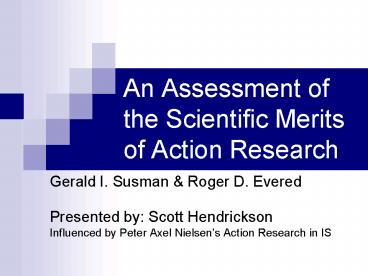An Assessment of the Scientific Merits of Action Research - PowerPoint PPT Presentation
1 / 13
Title:
An Assessment of the Scientific Merits of Action Research
Description:
Positivist science considers scientific knowledge to be obtainable only from ... the goals of social science, and ... interventions and social systems cause ... – PowerPoint PPT presentation
Number of Views:137
Avg rating:3.0/5.0
Title: An Assessment of the Scientific Merits of Action Research
1
An Assessment of the Scientific Merits of Action
Research
- Gerald I. Susman Roger D. Evered
- Presented by Scott Hendrickson
- Influenced by Peter Axel Nielsens Action
Research in IS
2
Crisis in Organizational Science
- Crisis in the field of organizational science
because - Research methods and techniques have become
increasingly less useful for solving practical,
organizational problems - Failure to recognize latent values behind the
claim to neutrality about how knowledge is
generated - Research lacks relevance to problems faced in
real world (separation of theory from practice) - Really a crisis of epistemology due to adoption
of a positivist model of science
3
What is Positivist Science
- Positivist science considers scientific knowledge
to be obtainable only from sense data that can be
directly experienced and verified between
independent parties - The world exists a priori as a unified and
causally organized system - The structure of the world can be inferred from
empirical observation - Data can be logically reconstructed into laws
(without regard to associated human meaning) - World can be hierarchically organized supporting
induction and deduction
4
Deficiencies of Positivist Science
- Deficient in its capacity to generate knowledge
for use by members of organizations for solving
the problems they face because of the following
assumptions - Methods are value neutral
- Treats persons as objects of study
- Eliminates the role of history in the generation
of knowledge - A system is entirely defined by its denotative
language - Knowledge of inquirer can be excluded from an
understanding of how knowledge is generated
5
Solution Action Research
- Action research as a corrective to the
deficiencies of positivist science... - is future oriented
- is collaborative
- implies system development
- generates theory grounded in action
- is agnostic
- is situational
6
Action Research
- It aims to contribute to
- the practical concerns of people in an immediate
problematic situation, - the goals of social science, and
- to develop the self-help competencies of people
facing problems - by joint collaboration within a mutually
acceptable ethical framework
- A cyclical process with five phases
- diagnosing
- action planning
- action taking
- evaluating
- specifying learning
- in order to develop a client-system
infrastructure
7
Cyclical Process of AR
8
Is Action Research Scientific?
- No, when judged by positivist science
- It doesnt meet the covering law criterion
- Actions derive meaning from the end pursued, not
prior associations - Planned interventions and social systems cause
variables to be dependent on context - Actions are seldom discrete events
9
Is Action Research Scientific?
- Yes, given different philosophical viewpoints
- Praxis the art of acting upon the conditions one
faces in order to change them - Hermeneutics the interpretation of languages,
culture, and history (no knowledge is possible
without presupposition) - Existentialism asserts the importance of human
choice and values, with respect to action, avoids
causal explanations - Pragmatism shifted the criterion of truth to the
practical consequences for adopting a particular
stmt. - Process philosophies you cannot step into the
same social system twice, organizations
constantly change, they are different - Phenomenology insists on the primacy of
immediate subjective experience is the basis for
knowledge - It generates knowledge which is contingent on a
particular situation and which develops the
capacity of members of an organization to solve
their own problems
10
Alternate Criteria and Methods
- Positivist Science
- Explanation
- Prediction
- Deduction and induction
- Detachment
- Contemplation
- Action Research
- Understanding
- Making things happen
- Conjectures
- Engagement
- Action
11
Contribution of Action Research
- Contributes differently to the growth of
knowledge than Positivist Science - Guides or action principles as opposed to rules
- Practics techniques providing know-how
- Enabling develops interpersonal and problem
solving skills, competence, - Infrastructure researcher acquires increasing
skills of developing organizational
infrastructure - Collaboration enlarges domain of inquiry from
them to us
12
Comparisons of PS and AR
13
Questions?
- Do you buy the argument for AR as a Science?
- Are the differences of AR from PS strengths or
weaknesses? - Explanation, Prediction, Deduction and induction,
Detachment, Contemplation - Understanding, Making things happen, Conjectures,
Engagement, Action - Can PS be used in conjunction with AR?
- Should AR be use on other types of systems?
- Is PS only appropriate for a very limited set of
phenomena?































